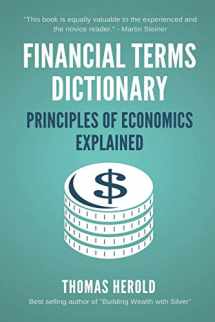
Financial Terms Dictionary - Principles of Economics Explained (Financial Dictionary)
ISBN-13:
9781521731154
ISBN-10:
1521731152
Author:
Thomas Herold, Wesley Crowder
Publication date:
2017
Publisher:
Independently published
Format:
Paperback
278 pages
FREE US shipping
Book details
ISBN-13:
9781521731154
ISBN-10:
1521731152
Author:
Thomas Herold, Wesley Crowder
Publication date:
2017
Publisher:
Independently published
Format:
Paperback
278 pages
Summary
Financial Terms Dictionary - Principles of Economics Explained (Financial Dictionary) (ISBN-13: 9781521731154 and ISBN-10: 1521731152), written by authors
Thomas Herold, Wesley Crowder, was published by Independently published in 2017.
With an overall rating of 3.6 stars, it's a notable title among other
books. You can easily purchase or rent Financial Terms Dictionary - Principles of Economics Explained (Financial Dictionary) (Paperback) from BooksRun,
along with many other new and used
books
and textbooks.
And, if you're looking to sell your copy, our current buyback offer is $0.35.
Description
Make Better Financial Decisions - Understand Economic Terms This practical financial dictionary for Economics terms helps you understand and comprehend most common economics lingo. It was written with an emphasis to quickly grasp the context without using jargon. Each of the 442 economic term is explained in detail and also gives practical examples. It is based on common usage as practiced by financial professionals. Compiled over the last 3 years from questions and feedback to financial articles published by the Wealth Building Course education program. Economics 101 This book is useful if you are new to business and finance. It includes most economic terms for businesses, investors and entrepreneurs. It also covers the lingo that was introduced in the financial crisis of 2008 until 2017. With the alphabetical order it makes it quick and easy to find what you are looking for. Financial Dictionary Series Additional financial dictionaries are available in this series. Please also check out: Accounting, Banking, Retirement, Corporate Finance, Investments, Laws & Regulations, Acronyms, Real Estate & Trading. Click on the author name to see them. Example: What is Market Sentiment? Market sentiment refers to the all around attitude investors have with regards to a certain financial market or specific security. It is the tone and feeling in a market. This is displayed via the price movement and activity of various securities which trade in a given market. Some have called it the market crowd psychology or investor sentiment. Rising prices in a market are indicative of bullish market sentiment, while declining prices indicate the sentiment in a market is bearish. What makes market sentiment so interesting is that it is sometimes not based on the underlying fundamentals of the security or market in question. At times it instead is based on emotion and greed rather than actual business valuations and fundamentals. This market sentiment matters immensely to both technical analysts and to day traders. These individuals read technical indicators in order to measure shorter term price movements which the attitudes of investors can cause in a given security. They attempt to profit from these price fluctuations. Such sentiment also is important for contrarian investors. They prefer to place trades in the opposite direction of any prevailing sentiment. When all other investors are buying, a contrarian will use this sentiment to instead sell. In general, market sentiment is referred to as either bullish or bearish. As the bulls have control, the stock prices are running up and away. As the bears are dominant, prices of stocks are declining or even plunging. Since the markets are subject to and driven from the emotion of the collective traders, the sentiment of the markets is often not correlated to the underlying fundamental values. This means that market sentiment is more about group emotions and feelings while the fundamental value is more about the actual business performance. Traders realize profits when they find those stocks which are either undervalued or overvalued because of their market sentiment. Traders and investors alike utilize different indicators to attempt to ascertain what the sentiment of the markets actually is. This helps them to decide which stocks are the best ones for them to trade. There are a number of these helpful indicators. Among the more popular ones are the following: VIX CBOE Volatility Index, Bullish Percentage, 52 Weeks High to Low Sentiment Ratio, 200 Days Moving Average, and 50 Days Moving Average. Note: This example description is shorted due to publish restrictions. Each term is explained with 600 words and more.


We would LOVE it if you could help us and other readers by reviewing the book
Book review

Congratulations! We have received your book review.
{user}
{createdAt}
by {truncated_author}


